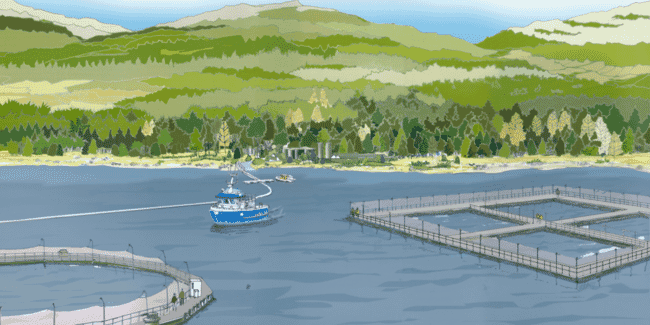
© Loch Long Salmon
Despite support from a host of national bodies, elected local representatives and the host Community Council, park officers have recommended the park board refuse Loch Long Salmon’s plans for Scotland's first semi-closed containment technology salmon farm.
The company behind the plans say they believe the recommendation goes against one of the key aims of the Park’s own partnership plan to “address national priorities and achieve benefits for Scotland beyond the National Park boundaries”.
The farm, which the company aims to install near Benn Reithe, on Loch Long, has been supported by an array of MPs, MSPs, councillors, communities and local people.
Loch Long Salmon have highlighted examples where National Park Officers seem to dismiss advice from national bodies and international experts including:
- The report says the development will impact the Endrick Water Special Area of Conservation (SAC), despite NatureScot stating “the proposal could be progressed with mitigation” which the company have agreed to.
- SEPA saying there had “No objections to the proposed development and no consentability concerns”
- NatureScot said there would be “no adverse impacts to marine mammals”
- The report refers to the technology as “experimental” , ignoring evidence from Dr Asa Maria Espmark, director of the internationally recognised CtrlAQUA research consortium, which shows semi-closed technology has been well proven to be operated with no sea lice treatments required and no escapes.
- The Atlantic Salmon Trust say which says, “We recognise that this technology has been used successfully in other countries.”
Stewart Hawthorn, managing director of Loch Long Salmon, said in a press release: “The Scottish Government and the National Park have both said this project is of national significance. It has the support of bodies such as SEPA, Forestry & Land Scotland and NatureScot; the local MP; a cross-party grouping of MSPs and Councillors; the host community council; and a range of local people and groups.”
“This transformative technology could have a positive environmental impact across Scotland by leading positive change in salmon farming, a critical food production sector and a vital part of our rural economy.”
“The technology has been proven for decades and has operated without any fish escapes over hundreds of production cycles. It removes the threat of sea lice and the need for treatment, protecting the seabed, and will never require acoustic devices to deter seals.”
“Waste and uneaten food gathers at the bottom of the enclosure, is brought on shore and can be used as the basis for fertiliser or green energy, contributing to the circular economy while growing the lowest carbon animal protein in the world.”
“Loch Long is the ideal location for our demonstration site. We are confident Board Members will see the benefits of this game-changing project, furthering the National Park’s goals by promoting sustainable business growth, creating jobs and supporting communities.”



